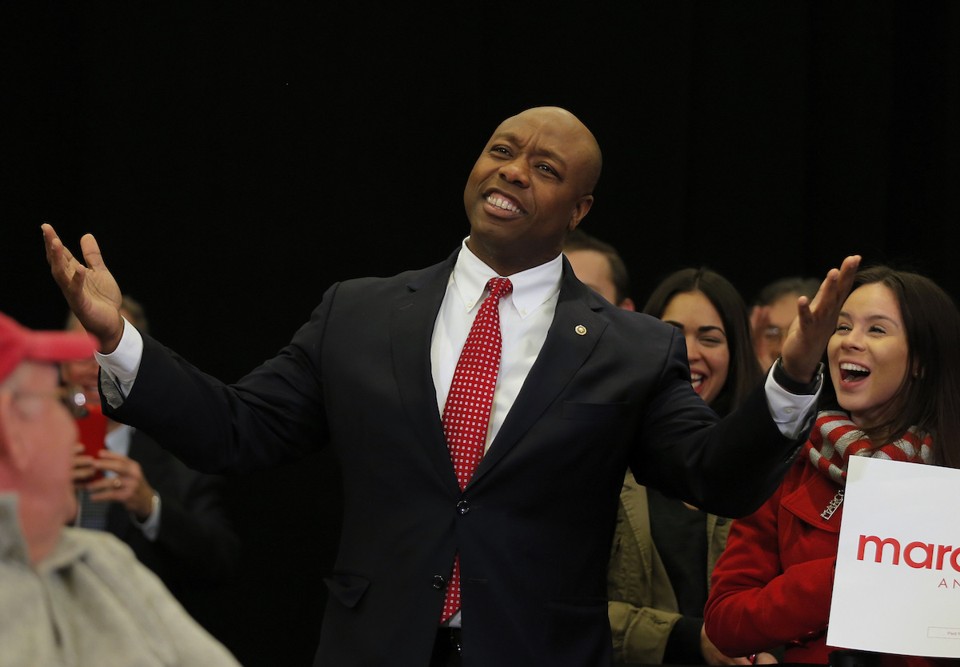PBS: Escaping Eritrea … [Read More...] about ካብ ውሽጢ ቤት ማእሰርታት ኤርትራ
The Senate’s Only Black Republican Opens Up About Being Mistreated by Cops
Citing recent killings by police, Tim Scott of South Carolina asked his colleagues to stop ignoring the struggles of those who face racial prejudice.

The first time he was stopped by police, his car had a malfunctioning headlight. A cop approached, hand on his gun, and told him, “Boy, don’t you know your headlight isn’t working properly?” He felt “embarrassed, ashamed, and scared. Very scared.”
Other traffic stops followed. Skipping past many of them, he chose to focus his remarks on “a time in my life when I was an elected official,” noting that while he would not share every interaction, “please remember that in the course of one year, I’ve been stopped seven times by law-enforcement officers. Not four, not five, not six, but seven times in one year as an elected official. Was I speeding sometimes? Sure. But the vast majority of the time I was pulled over for nothing more than driving a new car in the wrong neighborhood, or some other reason just as trivial.”
Another time, he said, a cop pulled him onto a roadside median and declared that he believed the car Scott was driving might be stolen. “I also think about the experiences of my brother, who became a Command Sergeant Major in the United States Army, the highest rank for an enlisted soldier. He was driving from Texas to Charleston,” he said. “Pulled over by a law-enforcement officer who wanted to know if he had stolen the car that he was driving because it was a Volvo. I do not know many African American men who do not have a very similar story to tell no matter their profession, no matter their income, no matter their disposition in life.”
A former staffer of his was the subject of one such story. He drove a Chrysler 300, “a nice car, but not a Ferrari. He was pulled over so many times here in D.C. for absolutely no reason other than for driving a nice car.” He sold that car to stop being targeted.
“Imagine the frustration, the irritation, the sense of a loss of dignity that accompanies each of those stops,” Scott said, relating that even on Capitol Hill, as a member of the Senate, he has been stopped by police and asked to prove his membership.
“There is absolutely nothing more frustrating, more damaging to your soul, than when you know you’re following the rules and being treated like you are not,” he declared. “But make no mistake. No matter this turmoil, these issues should not lead anyone to any conclusion other than to abide by the laws… there is never, ever an acceptable reason to harm a member of our law-enforcement community, ever.”
“Today,” he concluded, “I simply ask you this. Recognize that just because you do not feel the pain, the anguish of another, does not mean it does not exist. To ignore their struggles, our struggles, does not make them disappear, it simply leaves you blind and the American family very vulnerable. Some search so hard to explain away injustice that they are slowly wiping away who we are as a nation. But we must come together to fulfill what we all know is possible here: peace, love, and understanding. Fairness.”
In future remarks Scott will propose solutions.
One solution springs immediately to my mind. In a recent article, I called for ending needless interactions between police officers and motorists during traffic stops.
Subsequently, a reader turned me onto a fascinating Yale Law Journal article by Sarah Seo, who traces the bygone decision, shortly after the rise of the automobile, to charge police officers with enforcing traffic laws in addition to criminal statutes, rather than creating a separate entity to discharge that discrete task. The result: Over time, cops gained enormous discretionary power to stop and search individuals.
Is it time to revisit that decision?
Says Seo:
This authority has essentially become a general warrant––what the Framers actually intended to prohibit—in light of the reality that, at some point, all drivers violate traffic laws. To repeal the twentieth-century version of the general warrant and to put some limits on police discretion may require severing the two sources of power. Berkeley Police Chief August Vollmer had already proposed one way of doing so: establish a separate agency to deal with traffic. Vollmer’s intention was to free the police from pesky traffic duties so it could focus on fighting crime. But a division of labor would also curb the use of traffic-law enforcement as a prelude to the criminal process, which, as Reich had pointed out, handed the police too much leverage and created opportunities for abuse.
Perhaps a non-police agency charged with enforcing traffic laws could safely discharge its duties without being armed, much as parking-enforcement teams do today. In doing so, they could perhaps defuse a large part of the fear that pervades traffic stops that involve armed cops and motorists who don’t know their intentions.
